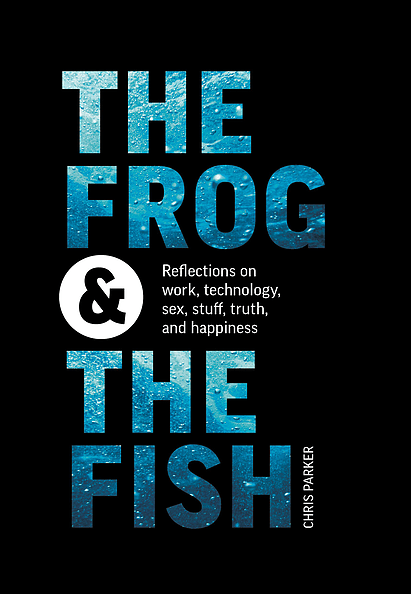By: Akos Balogh
I feel sorry for the teenagers of today.
They have to navigate many challenges that I never had to deal with as a teenager of the ‘90’s: social media, a pornified culture, digital technology…I don’t envy them or their parents. Coming of age in the early ‘90’s sure had its advantages (including the music).
But into this challenging cultural moment steps a book that’s as timely as it’s readable: ‘The Frog and the Fish: Reflections on work, technology, sex, stuff, truth and happiness’, by Australian author Chris Parker.[1]

Book Image courtesy of National Institute of Christian Education
The Frog and The Fish is written for late high schoolers – those on the cusp of leaving high school and entering young adulthood. It helps them explore the issues teenagers have always had to deal with: sex, happiness, identity, and so on. But it also explores newer issues that define the lives of many digital natives, such as technology. And it does this by developing a Christian world-view – a ‘lens’ of the world – and then examines these areas through that Christian lens.
The result is a short and insightful book, which applies the gospel of grace to these topics – and in a way teenagers can relate to.
A life without grace isn’t really life: it’s less than life. At its best it’s swimming in a shallow sea of anxious striving and self-serving.’ – Chris Parker
The Engaging Structure of the Book
The book is divided into 4 parts.
The first part – ‘Why the frog and the fish?’ – gives two analogies that helps us understand how our culture shapes us. Firstly, there’s the story of the frog that jumps into a stove pot containing warm water. The frog, however, eventually boils to death, because it doesn’t notice the slow rising of the water temperature – until it’s too late. The fish, on the other hand, is so used to the water around it, that it’s unaware of it. Parker explains:
The frog and the fish are living (or dying) in something that is having a shaping effect on them: the water of their world. The way that we think about and approach the questions, issues, and decisions of life will be shaped by the water of our worlds. Just like the frog and the fish, this happens whether we are aware of it or not.’ (p17)
Part 2 explores the big questions of the life that teenagers (and all of us!) often ask: Who am I? Where am I? What’s the point?
Here Parker highlights some of the dominant narratives that saturate our culture, including: the materialist view (humans are merely atoms, cells, chemical reactions); Darwinist view (humans as highly evolved animals); consumerist view (our identity and self-worth is based on our consumption); digitalist view (human identity is defined by the number of connections or virtual friends); and sexualist view (our worth is defined by our sexuality).
As I read them, I couldn’t help thinking how often I’ve swallowed the assumptions of many of these views – (the consumerist view being the one I felt particularly convicted by!). We really are like fish, oblivious to the sea of our culture. And if we’re not careful, we’re in danger of becoming like the frogs, where we ‘continue to ignore our vertical identity [with God] and trade it for a shallow, anxiety-rich, horizontal identity.’ (p30)
After examining these alternate worldviews, Parker lands on the gospel, showing how it’s different, and – crucially – how it’s better. Not least, the gospel provides with a new identity that’s ‘refreshing, hopeful, purposeful, and liberating.’ (p28)
Part 3 looks at specific issues through the ‘gospel-lens’. Work, sex, truth, happiness, consumerism and technology are all discussed – but in a simple yet insightful way. I particularly liked how he handled technology – a big one for current teenagers, who have ‘enthusiastically, and completely, embraced a technology so powerful in its shaping influence.’ (p67)
He goes beyond a simplistic call to only watch good content (as important as that may be). Instead, he gives a more holistic examination of how technology fits into God’s plans and purposes, and how Christians should use it. Namely, with disciplined discernment.
His section on happiness is likewise brilliant, not least because he calls out the harmful cultural narrative of our always needing to feel happy. Not only is there ‘a growing number of psychologists and commentators suggesting that our pursuit of constant happiness may actually be the cause of much unhappiness.’, (p114) but ‘deep happiness can only come from a hope that is outside ourselves’, namely the gospel of Jesus Christ.
Finally, Part 4 is a beautiful exploration of God’s grace to us in Jesus, a grace that frees us from a burden that crushes so many teenagers – ‘the burden to keep proving myself, and looking out for myself, above others.’ (p128). Instead, grace gives us the ability to ‘be discerning towards the water we are swimming in,’ using God’s good gifts the way that He intended – for our good, and for His glory.
The Genius of this Book
The genius of this book is that Parker takes complex ideas and makes them simple and interesting: accessible for teenagers yet packed with wisdom and insight. I wish I had this book when I was launching from late high school!
Many a teenager – both Christian and non-Christian will benefit from its godly wisdom. And it’s a book that parents, youth group leaders, school (and university!) chaplains – anyone that works with late high schoolers and young adults – will do well to give to teenagers, as they navigate the complex and often toxic culture they’re swimming in.
Oh, there’s also an accompanying website with extra resources, that’s worth checking out: https://www.thefrogandthefish.com/
So, help the teens in your life swim against the tide of our culture by grabbing them a copy of this great book.
[1] Chris Parker, The Frog & The Fish – Reflections on work, technology, sex, stuff, truth and happiness (Penrith: National Institute for Christian Education, 2017). Available from Koorong.
Article supplied with thanks to Akos Balogh.
About the Author: Akos is the Executive Director of the Gospel Coalition Australia. He has a Masters in Theology and is a trained Combat and Aerospace Engineer.




